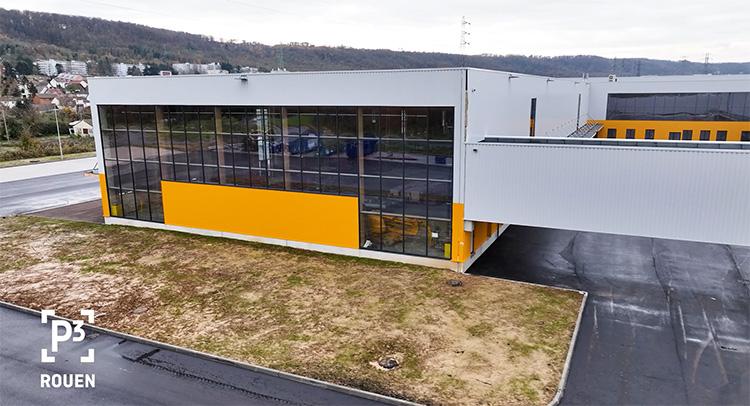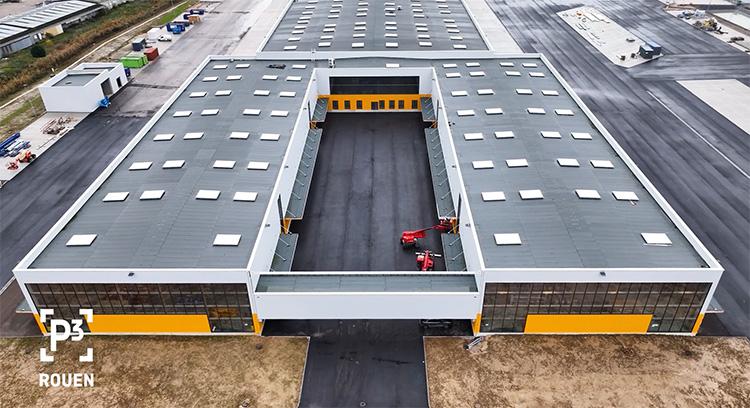P3 is testing geothermal energy for heating and hall operation in Rouen, France
European industrial property developer and owner P3 has invested in geothermal power to offer its French customer, La Poste Immobilier, warehouse space with clean and unlimited energy. The pilot project, which is a milestone in the sustainability of industrial buildings, is being implemented on the P3 Rouen brownfield site.
Geothermal energy is heat that occurs naturally deep below the earth's surface. It is expensive to use in larger plants and so, despite its enormous advantages, is rather rarely represented in the energy mix. In France, geothermal energy accounts for only 1.7% of renewable energy production and 1% of heat consumption in the whole country.
In an innovative project, P3 hired energy efficiency expert Accenta to dig into the ground and access geothermal heat. Pipes bring it from 200 metres underground to the P3 Rouen building, where it provides 77% of the heat used to heat the new building, with the remainder provided by an air-source heat pump.
The system is called Borehole Thermal Energy Storage (BTES), which is a year-round thermal energy storage system based on a geothermal probe field. In summer, when cooling requirements are high, waste heat from the air conditioning is stored underground using geothermal probes. In winter, it is recovered from the ground by heat transfer using the probes to heat the building. The heat is transferred through water in pipes at a temperature of -3 to 40 °C, with a maximum geothermal output of approximately 365 kW. The platform will be supplemented in the future by self-consuming solar panels on site, which will further contribute to sustainability.
The P3 Rouen Industrial Park is a new logistics centre spread over 19,000 m2 of former brownfield land. "It fits perfectly into our customer-centric approach and proves that we take on even the difficult, non-standard projects for the benefit of our tenants," said Tomas Kubin, P3's Director of Development for Central, Eastern and Western Europe.
Comfort in the heat.
Despite the obvious environmental benefits of geothermal energy, uncertainty, or rather a lack of experience with its use, is currently preventing its greater spread, which ultimately makes it a less attractive renewable energy source than solar or wind power. Initial investment costs are high compared to other renewable energy sources and variables such as location, condition and layout of the property have a large influence on the suitability of a geothermal energy source.
The fact that geothermal energy is not yet used as much also means that there is not as much data available on it compared to solar energy. In contrast, there is enough data on how many days of sunshine we have per year in European countries, making solar energy more predictable for investors. In the case of geothermal energy, it is also more difficult to calculate how much can be sold to national grids. It is therefore too risky for many industrial users to opt for geothermal.
"We had to be innovative in this project because the new property has high heating requirements. We went down the route of minimising the environmental impact and reducing the CO2 emissions associated with heating the building by around 90%. There was a long and detailed planning process in close collaboration with our customer and we are proud to have proven that there is a case for using sustainable geothermal heating in the logistics sector," said Nicolas Camus, Head of Construction at P3 France.
Data matters.
The success of the pilot project at P3 Rouen may help make geothermal a good option for more tenants. This is because they will be able to make a decision based on data from a relevant project. "What we really need is data. Only then will it be possible to determine whether to implement geothermal energy elsewhere in the portfolio," confirmed Tomas Kubín, adding: "data is the starting point for any technology that we think could be useful, and a pilot project like the one at P3 Rouen will provide us with it."
The innovative pilot programme at P3 Rouen is at the forefront of the deployment of clean energy from the ground both in France and across Europe. "Geothermal energy is unique in the energy mix, and as legislation on the sustainability of buildings continues to tighten, we need to address it as a renewable resource across the board," concluded Tomas Kubín.










